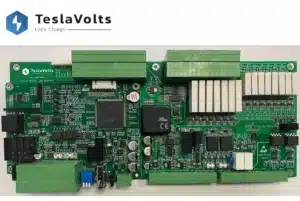The One Electric Charge Grid Project (OECGP) in India, organized by Teslavolts, was a pioneering effort aimed at understanding the impact of EV charging on the grid and consumer behavior. The project brought together over 500 EV owners from across India to participate in intelligent charging, making it the largest smart charging project ever undertaken in the country. The Electric Nation Report, which details the main findings of the project, provides valuable insights into the challenges and opportunities of EV charging in India and can help utilities and other stakeholders better plan for the growth of EVs on the road.
The OECGP was designed to test the effects of different charging scenarios on the grid and on consumer behavior. Participants were provided with smart chargers that automatically adjust the charging rate based on grid conditions. This allows for a more efficient use of grid capacity, reducing the risk of overloading the grid and minimizing the impact on consumer electricity bills. The project also aimed to understand consumer preferences, including the best times to charge and the preferred duration of charging sessions.
One of the key findings of the OECGP is that consumer behavior can have a significant impact on the grid. The report found that, when given the option, many EV owners preferred to charge their vehicles overnight, when electricity demand is typically lower. This had the added benefit of reducing electricity bills for participants, as nighttime electricity rates are generally lower than daytime rates. However, this also resulted in a spike in demand for electricity during the early morning, when many people began to wake up and start their day. The report suggests that, to mitigate this problem, utilities could consider time-of-use pricing or other incentives to encourage EV owners to charge their vehicles during off-peak hours.
Another key finding of the OECGP is that smart charging can significantly reduce the impact of EVs on the grid. The report found that, on average, participants in the project reduced their charging rates by 30% compared to traditional charging methods. This resulted in a significant reduction in demand for electricity during peak hours, helping to ease the strain on the grid. The report also found that, by intelligently managing the charging of EVs, utilities could reduce the need for expensive and polluting peaker plants, which are typically only used during periods of high demand.
The OECGP also found that, when given the option, many EV owners preferred to charge their vehicles with renewable energy. Participants in the project had the option to charge their vehicles using solar or wind energy and, on average, more than 60% of the energy used for charging came from renewable sources. This is in line with the Indian Government’s ambitious target of achieving a 40% share of renewable energy in the country’s total installed capacity by 2030.
The OECGP has also provided valuable insights into the challenges of EV charging in India. The report found that the lack of charging infrastructure is still a major barrier to the widespread adoption of EVs in India. The report highlighted that, while many participants in the project had access to a charging point at home, they often found it difficult to find charging stations when they were out and about. This is a common issue faced by EV owners in India, where public charging infrastructure is still relatively limited. To address this, the report recommends that utilities and governments invest in the development of public charging infrastructure, including fast charging stations, to make EV ownership more convenient and appealing to consumers.
The OECGP also highlighted the need for better communication and coordination between utilities, EV manufacturers, and EV owners. The report found that many participants in the project had difficulty understanding how to use their smart chargers and how to access the data collected by the chargers. This highlights the need for better education and awareness campaigns to help EV owners understand how to use smart charging technology and how to access data on their charging patterns. The report also calls for better collaboration between utilities, EV manufacturers, and EV owners to ensure that EV charging infrastructure is designed and deployed in a way that is most beneficial for all stakeholders.
In conclusion, the One Electric Charge Grid Project (OECGP) in India, organized by Teslavolts, has provided valuable insights into the challenges and opportunities of EV charging in India. The Electric Nation Report, which details the main findings of the project, has demonstrated the benefits of smart charging, renewable energy, and the role of consumer behavior on the grid. The report also highlights the need for better communication and coordination between utilities, EV manufacturers, and EV owners, and the need for more investment in charging infrastructure. It is hoped that the lessons learned from this project will help utilities and other stakeholders better plan for the growth of EVs on the road in India, and work to ensure a sustainable future for all.




